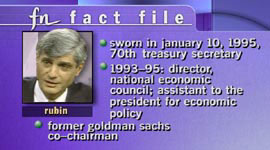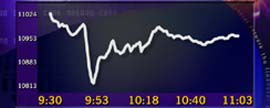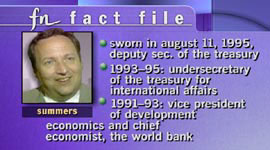|
Treasury's Rubin resigns
|
 |
May 12, 1999: 7:01 p.m. ET
Deputy Treasury Secretary Summers to be nominated as successor
|
NEW YORK (CNNfn) - Treasury Secretary Robert Rubin announced his resignation Wednesday, capping a four-year tenure marked by soaring gains on Wall Street and joblessness at its lowest levels in a generation.
Rubin, widely regarded as Wall Street's guy at the White House because of his successful career as a bond trader at Goldman Sachs, will step down by July 4.
In an interview on The Moneyline News Hour with Lou Dobbs, Rubin said, with the U.S. economy in good shape, he felt it was time to go home to New York.
"I came to feel within myself that it was time to go," he said, adding he would not have announced his resignation if the U.S. economy was in "tumult" or if the Clinton administration did not have a strong team of economic advisors to carry on.
Rubin, an avid fly-fisherman, said he has no specific plans other than to grab his fishing fishing rod, his tennis racket and "a bunch of books" and spend time with his family and "think all this through."
While rumors of his resignation have cropped up in the market frequently over the last few months, Rubin said the decision to leave came to him only recently, adding he told President Clinton last Wednesday that he wanted to step down.
"Bob has been acclaimed as the most successful Treasury Secretary since [the first one,] Alexander Hamilton, and I think that acclaim is well deserved," Clinton said at a White House news conference. "I will miss his cool head, steady hand and kind heart."
Clinton said he would nominate Deputy Treasury Secretary Lawrence Summers as Rubin's successor.
'A tough act to follow'
Rubin, 60, has been one of the architects of the Clinton administration's economic policy, and is often credited -- along with Federal Reserve Chairman Alan Greenspan -- for the booming eight-year economic expansion, the second-longest in U.S. history.
The appointment of Summers, a close ally of Rubin and a former Harvard University professor, would require Senate confirmation, beginning with a hearing before the Finance Committee, chaired by Bill Roth, a Republican from Delaware. It wouldn't go through the House.
Sen. Phil Gramm, R-Texas, chairman of the Senate Banking Committee, said Wednesday that he respected Summers and did not foresee any problems with the nomination. His committee will hold its own hearing because the Treasury Secretary's influence extends so far into banking.
"I don't think it's a 'gimme' that this appointment will move forward quickly, but everything that I know about Larry Summers is good," Gramm told CNNfn.
As Summers took the podium Wednesday, he summed up Rubin's legacy succinctly, telling reporters: "This is not an easy act to follow."
Indeed, Rubin is credited with devising plans early in Clinton's first term to turn a huge U.S. budget deficit into a surplus, crafting the bailout of the Mexican peso, and stemming the fallout of the worldwide financial crisis in 1997 and 1998 by steering emergency aid to flailing countries such as South Korea, Russia and Brazil.

Click on image to see a larger version
The news Wednesday morning caught markets worldwide off guard, though most bounced back after initial drops. The Dow industrials lost about 200 points as early reports surfaced about the resignation but the blue chip index bounced back to close at 11,000 -- down only 25 points.
Bond prices also rebounded after an initial sell-off. The benchmark 30-year issue was trading up for a yield of 5.82 a little after 2 p.m. Eastern time.
The initial market reaction was a tempest in a tea cup, said John Ryding, an economist at Bear Stearns.
"It's a change in personalities in the Treasury," he said. "I don't think it's a change in policies."

Dow industrials' performance Wednesday morning on Rubin resignation news
Rubin is best known for championing a strong U.S. dollar against the Japanese yen, as well as his efforts to defuse the worldwide financial crisis through multi-billion dollar bailout deals coordinated with the International Monetary Fund.
Hours after the White House confirmed the resignation, Greenspan, Rubin's close ally, lauded him as one of the most effective Treasury secretaries in history. Rubin and Greenspan met almost weekly to discuss business and global market developments at breakfast sessions that Summers also often attended.

Click on image to see a larger version
Summers "is a person of extraordinary talent and judgment, who will continue the important work Bob Rubin initiated," Greenspan said.
Rubin succeeded Lloyd Bentson, Clinton's first Treasury secretary, in 1995. Almost since the beginning of Rubin's term, the rumor mill periodically whirled with speculation about his possible resignation.
Rubin wanted to wait until the impeachment trial of Clinton, which concluded with acquittals in February, was over. He apparently decided 10 days ago that he would step down and return to New York, sources told CNN.
An outsider from Wall Street
Rubin never settled into the Washington scene, and shuttled on the weekends to New York to be with his wife, Judith, who did not want to leave Manhattan and move to the capital.
But Rubin is one of the longest serving Treasury secretaries in history, and if he stays though July he'll become the longest serving Treasury chief in nearly 50 years.
"It's been long expected," Robert Dederick, an economic consultant at Northern Trust Co., said of the resignation. He said that Summers, 44, is considered an intellectual wunderkind and well-groomed for the role.
Summers "holds the same open market, strong dollar philosophy," said Bill Sullivan, economist at Morgan Stanley Dean Witter.
Presidential hopeful Rep. John Kasich, R-Ohio, said he hopes Summers will favor a hands-off approach, considering tax cuts and not burdening the high-tech world with regulation. (576K WAV) or (576K AIFF). Kasich, chairman of the House Budget Committee, said he hopes Summers will also make the positive side of free trade clear to U.S. employees.
However, Summers' relationship with Wall Street will not be the same as that of Rubin, the consummate Wall Street insider, said Bruce Steinberg, chief economist at Merrill Lynch. Rubin served as co-chairman of investment bank Goldman Sachs & Co. (GS) before being tapped for the Treasury post in 1995.
Rubin "came from the Street and understood everything there was to know abut financial markets, " Steinberg said. Summers "does not have the same deep savvy."
Stuart Eizenstat, undersecretary of state for economic and business affairs, is expected to move to the No. 2 Treasury spot.
Rubin, who worked for 26 years at Goldman Sachs, was known for being straightforward and courtly. He has a law degree from Yale and spent a year in Britain at the London School of Economics. The Rubins have two adult sons.
-- by staff writers Martha Slud and Alex McMillan
|
|
|
|
|
|
Track your stocks
|
Note: Pages will open in a new browser window
External sites are not endorsed by CNNmoney
|
|
|
|
 |

|

